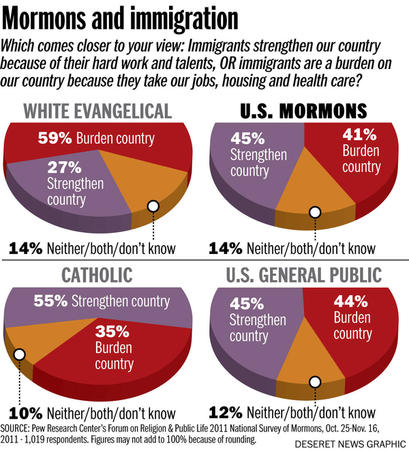President Uchtdorf Speaks Out on Immigration
Recently Dieter F. Uchtdorf, second counselor in the first presidency of The Church of Jesus Christ of Latter-day Saints, visited with President Barack Obama to present the Church’s position on immigration reform. A recent Pew Research Center’s Forum on Religion and Public Life in-depth survey of Mormons in the United States asked about their opinions on immigrants within the United States.
Immigration is a controversial topic in the United States. The survey asked one question on this topic. They were asked which of two statements most closely matched their view, even if they didn’t completely agree. They were asked whether immigrants strengthen or burden the nation. No distinction was made between legal and illegal immigration, leaving those polled to decide for themselves what the question meant.
 In the general U.S. population, 45 percent of Americans feel that immigrants strengthen the country, while 44 percent burden it. 12 percent feel that neither or both are true or they have no opinion on the subject. Mormon views closely mirror these statistics. 45 percent of Mormons also believe immigrants strengthen the nation, although a smaller number, 41 percent, consider them a burden on society. The number of Mormons who accept both or neither or who have no opinion is higher, at 14 percent.
In the general U.S. population, 45 percent of Americans feel that immigrants strengthen the country, while 44 percent burden it. 12 percent feel that neither or both are true or they have no opinion on the subject. Mormon views closely mirror these statistics. 45 percent of Mormons also believe immigrants strengthen the nation, although a smaller number, 41 percent, consider them a burden on society. The number of Mormons who accept both or neither or who have no opinion is higher, at 14 percent.
These numbers separate them from evangelical Christians, one of the few political areas in which they disagree. Within the white evangelical population, 59 percent believe immigrants are a burden, and 27 percent believe they strengthen the country. Like Mormons, 14 percent answered both, neither, or no opinion.
The statistics for Mormons shows a strong divide based on age, income, and education, as well as on religious commitment. Only 36 percent of highly committed Mormons see immigrants as a burden, while 50 percent of those who are less committed see them as a burden. This largely correlates with economic status. 84 percent of Mormons who are highly committed to their religion are college graduates. (The church strongly encourages
education, which may be a factor in this.) Only 50 percent of those with high school educations are strongly committed to their faith. This statistic is very unusual in the religious world. For most religions, the least educated are the most religious.
49 percent of Mormons under age 50 see immigrants as a strength. 39 percent of Mormons over 50 see it as a strength.
Beyond the study’s statistics, several other factors influence the Mormon view of immigration. Many Mormons serve missions for their church. For two years, they live wherever they are sent, learning the language and living as the people in that community live. They go into the homes, attend the churches, and do service work in addition to their missionary work. Many of those serve in Spanish countries and have a realistic view of the hardships faced by those people. They come home with a compassionate view of the world and an understanding that Americans have much easier lives than most. The love missionaries almost invariably develop for the people they served influences their views on immigration.
President Uchtdorf’s statements during the meeting align with the Church’s endorsement of the Utah Compact, a law working to create a balanced legal approach to immigration. In November, 2011, L. Whitney Clayton gave an official statement from the church about the position:
Three principles should be closely followed in dealing with immigration law
- We follow Jesus Christ by loving our neighbors. The meaning of neighbor includes all of God’s children, in all places and in all times.
- We recognize an ever-present need to strengthen families. Families are meant to be together. Forced separation of working parents from their children weakens families and damages society.
- We acknowledge that every nation has the right to enforce its laws and secure its borders.
While Latter-day Saints may be more generally in favor of immigrants than other religious groups, it is notable that more than forty-percent stand at odds with the Church’s position on this issue.


